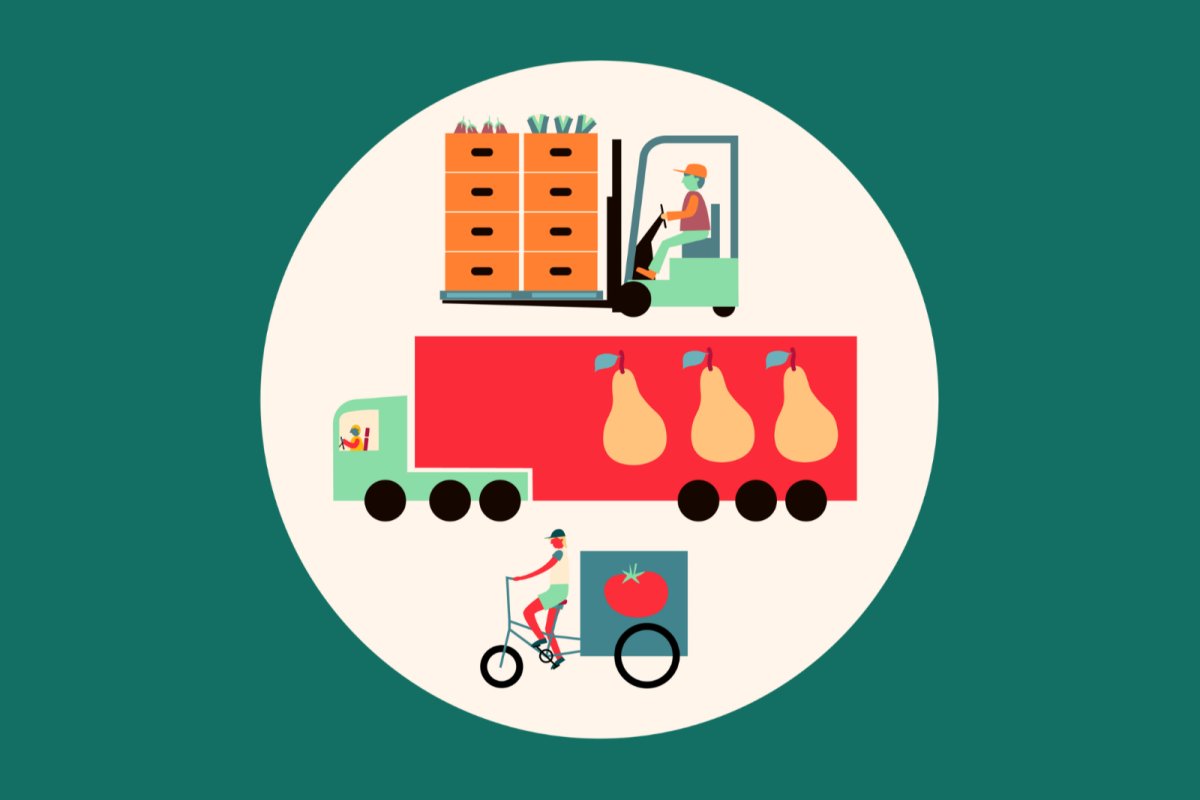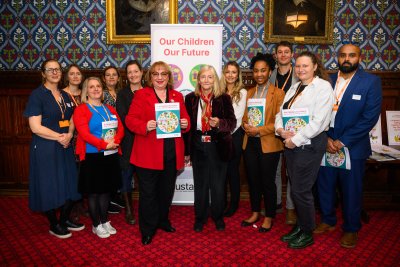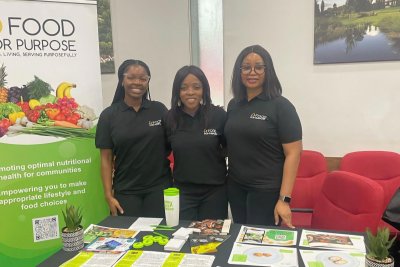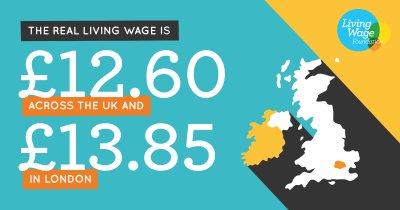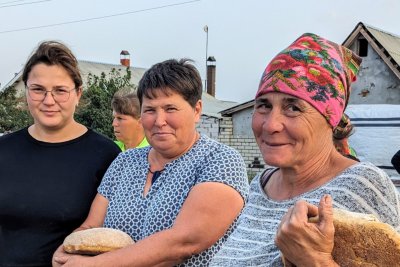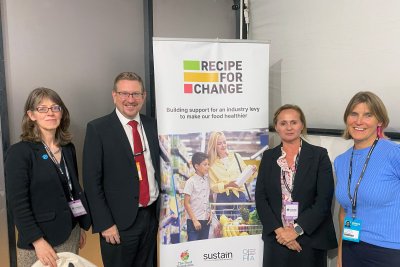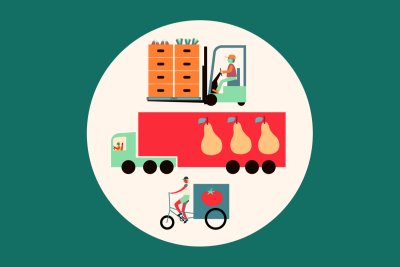 Bridging the Gap. Credit: Sarah Hoyle
Bridging the Gap. Credit: Sarah Hoyle
Fixing supply chains for a fairer food future
Following Bridging the Gap’s first in a series of webinars, Hannah Gibbs takes an optimistic view on the role of food hubs and ethical wholesalers to fix opaque food systems and deliver organic fruit and veg to people on low incomes, with next steps for the movement.
Levelling the playing field
Food hubs and wholesalers are, as Sean Ruffell of Organic North put it, “a necessary cog between growers, retailers and customers”, facilitating access to organic fruit and veg. Both of the wholesaler panellists at our food hubs webinar (Sean Ruffell and Danny Fisher of the Better Food Shed), were clear on three principles of what an ethical wholesaler should look like:
- Farmer focused: don’t haggle with growers, pay farmers a fair price and pay quickly, commit to buy as much of the farmer’s produce as they can speaking to them regularly about what they have, work on trust rather than punitive contracts
- Sustainable: trade as locally as possible, work on a zero food waste model as they don’t stock produce, no air freight
- Fair: take low margins and pay staff proper wages
However, not all wholesalers operate according to the same ethical standards meaning a high cost is passed on to customers and to the planet. As Danny pointed out, large wholesalers and supermarkets are not paying the real price of food, meaning that the trading market is skewed against ethical wholesalers and ultimately against farmers who do the right thing.
Food hubs also need good tech to do their work quickly and efficiently. Djenai Delarue outlined how the Open Food Network’s (OFN) open-source data platform enables small hubs to automate bills, receipts and stock. They have extended this work through a Food Data Collaboration to develop a common data infrastructure to allow producers in an area to list and sell produce seamlessly across multiple platforms.
Sean shared the investment that Organic North has made in its software which has made the business more efficient, bringing down the price they charge. Such tech capabilities are vital to businesses setting up and/or scaling in organic wholesale.
Creating optimum scale
Both Manchester-based Organic North, and London’s Better Food Shed, demonstrate what is possible when a food hub operates at scale. Sean highlighted the importance of scale, as small scale food hubs would make organic food more accessible to more people, but this would focus on those who can afford organic.
Without larger scale, prices remain uncompetitive and out of reach for those on lower incomes. With scale these businesses become logistically efficient, can be responsive to ‘just-in-time’ orders from restaurants and have a healthier bank balance so are more resilient to market changes. All these factors mean improved trust with growers and customers, as well as lower prices.
For Danny, Public Sector Procurement presents an opportunity for businesses like theirs to achieve optimum scale while also providing high quality organic fruit and vegetables to a wider, more diverse population. However, the structure of these contracts makes it difficult for small companies to access. Additionally, reliance on large caterers means kitchens are not set up to prepare the food that these wholesalers and hubs provide. The good news is a concerted effort with government backing could change this. In Copenhagen, where support for kitchen conversion was provided alongside a government target of 60% organic in schools, the food system has been transformed meaning this ambitious goal was achieved.
With organic wholesalers operating at optimum scale, panellists argued, there would be scope for a network of more locally positioned food hubs, supplied by the wholesaler to ensure easier access to rural and urban locations in a hub and spoke formation.
Routes to market
Rebecca Laughton of the Landworkers’ Alliance explained the work that agroecological growers are doing to push for better government support for small scale growers selling via farmer focussed routes to market. The Fruit and Vegetable Aid Scheme is an EU policy retained by the UK post-Brexit which provides financial support to networks of producers (50% matched funding for measures to improve productivity and sustainability). As currently designed, the F&V Aid Scheme is not available to agroecological growers as access to it requires membership of a Producer Organisation (PO). A PO is a group of at least five edible horticulture businesses with a combined minimum turnover of 100 million euros of marketable produce, who are selling at least 75% of their produce through the PO. On the whole POs enable growers to co-operate to sell their produce to supermarkets.
As many agroecological growers prioritise selling direct (via their own box scheme or farmers market stall), the requirement to sell at least 75% through the PO blocks them from being able to access F&V Aid scheme funding. Defra is currently consulting with the horticultural sector on how to redesign the F&V Aid Scheme to make it more inclusive and supportive of the horticulture sector. Smaller scale agroecological and organic growers are actively contributing ideas to this consultation, as well as joining with the wider horticulture sector to push for a more generous budget to fund the expansion.
So, what can the movement do next?
We at Bridging the Gap are advocating for changes in supply chain that have the power to reduce prices of and increase access to organic fruit and vegetables for people on low incomes. Here’s how the panel suggested we get there.
Collectively advocate for change in government policies, systems and regulation
Improving access to government schemes: Rebecca shared one way in which government support might be unlocked for growers through working together in a hub style format through the F&V Aid Scheme. More of these schemes need to be available to organic producers.
Requirements for higher standards from all supply chain actors: The government needs to take responsibility for levelling the playing field. For example, Rebecca called for changes to the Grocery Code Adjudicator to enable better security for farmers. “By collaborating we could build power” to make the changes like these to government systems.
Collectively advocate for local authority and central government support
Rent relief and lowering of business rates: Both Sean and Danny shared the pressure of council costs, which, if reduced, would make a real difference to their viability and competitiveness in a skewed market.
Setting targets for organic in public sector procurement: This would enable the UK to meet its net zero goals and matching this with support for training and kitchen conversion as in Denmark would amplify the potential of these organic supply chains.
Start-up grants: More support is needed for vital start up infrastructure including the technology to support logistics so that ethical wholesalers can compete with those less ethical businesses skewing the market against organic and fairness in supply, a point made by Josiah Meldrum of Hodemedods at a panel at the Oxford Real Farming Conference and highlighted by our panel.
- Find out more about Bridging the Gap
- Read the LWA’s report on “Horticulture across Four Nations”
- Listen to Sean on BBC’s Food Programme
Bridging the Gap: Bridging the Gap to climate and nature friendly food for all.
Sustain
The Green House
244-254 Cambridge Heath Road
London E2 9DA
020 3559 6777
sustain@sustainweb.org
Sustain advocates food and agriculture policies and practices that enhance the health and welfare of people and animals, improve the working and living environment, promote equity and enrich society and culture.
© Sustain 2024
Registered charity (no. 1018643)
Data privacy & cookies
Icons by Icons8
